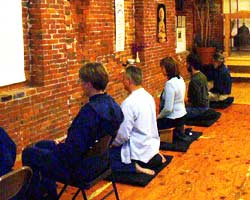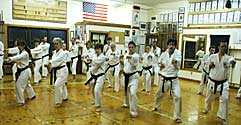Holding Hands With Zen: The Martial Arts Connection
An Interview with Jeff Brooks
By Anna-Maria Goossens
 Try this: Scan through the martial arts films you’ve seen, and
try to remember how you were introduced to the lead head-cracker. Chances
are, he was probably meditating or going through some Buddhist ritual.
Do you believe he was sincere? Since such images are the extent of many
people’s experience with martial arts or Buddhism, it’s no
surprise that there is a lot of misinformation about how the two relate
to one another. People could reasonably wonder if they have anything
to do with each other at all. Try this: Scan through the martial arts films you’ve seen, and
try to remember how you were introduced to the lead head-cracker. Chances
are, he was probably meditating or going through some Buddhist ritual.
Do you believe he was sincere? Since such images are the extent of many
people’s experience with martial arts or Buddhism, it’s no
surprise that there is a lot of misinformation about how the two relate
to one another. People could reasonably wonder if they have anything
to do with each other at all.
“Karate and Zen as one”
-- Shoshin Nagamine
|
|
“I have heard some people with the facile idea that Zen and the
martial arts have nothing to do with each other because they suppose
that one is about peace and the other is about fighting — or, conversely,
that Zen and the martial arts are related mainly in their belief that
if they meditate, they can kick ass better,” summarizes Sensei
Jeffrey Tesshin Brooks, Director of the Northampton Karate Dojo and Zendo
(a hall, building or area for Zen mediatation).
Neither view gets at the true relationship between the two, which is
for Brooks a real, complex, rewarding and key tenet of his instruction
at the dojo.
 It’s obvious the minute you set foot inside the dojo. Pictures
of Bodhidharma, who brought meditative Buddhism to China, and photos
of important figures in Shorin Ryu Okinawan karate, the style he teaches,
hold equal pride of place on the dojo walls. Calligraphy about karate
and Buddhism also hang next to each other. This pairing was inspired
in large part by the founder of Shorin Ryu Karate, Shoshin Nagamine,
a proponent of “Ken Zen Icho Nyo” (meaning “Karate
and Zen as one”). It’s obvious the minute you set foot inside the dojo. Pictures
of Bodhidharma, who brought meditative Buddhism to China, and photos
of important figures in Shorin Ryu Okinawan karate, the style he teaches,
hold equal pride of place on the dojo walls. Calligraphy about karate
and Buddhism also hang next to each other. This pairing was inspired
in large part by the founder of Shorin Ryu Karate, Shoshin Nagamine,
a proponent of “Ken Zen Icho Nyo” (meaning “Karate
and Zen as one”).
Recently, Sensei Brooks and I discussed how he feels about Zen and karate
being connected.
AMG: How are Zen and karate connected?
Brooks: Zen and martial arts share the development of Samadhi: one-pointed
concentration (a state of consciousness beyond waking or sleep in which
conscious mental activity ceases so to allow total absorption with the
object of concentration).
In Buddhism, it’s a tool — not an end in itself — that
is applied to achieve insight into reality. You can take that same tool
and apply it to karate. It will increase your skill, but it doesn’t
necessarily help you have a better human life unless it’s done
with the correct motivation. To have deep samadhi we have to allow all
mental disturbances to cease – disturbances including anger, hatred,
greed and so on.
AMG: Right — people who don’t know karate often assume you’re
picturing a certain person you’re mad at when you’re doing
punches, say. And one of the things I learned fairly quickly through
my practice of karate is that using anger like that isn’t effective
at all. I get distracted and then pretty soon I’m doing the wrong
technique…
“Spontaneity is only possible
after you get rid of hindrances and become free of the
disturbances”
|
|
Brooks: But, significantly I think, anger is what brought you
in the door. There are lots of martial arts programs that do encourage
students to use negative emotions. It hurts the students. On a personal
level, they become irritable and thin skinned, and from a purely performance
point of view, they become stiff in their movements and they tend to
burn out quickly. You may start out your martial arts career with negative
emotions, but you don’t want to perpetuate that. At the same time
you can’t fake it -- you don’t have to banish or ignore your
negative emotions. You use them, and then you can let them go. Negative
emotions may work like kindling. To stay warm for a whole winter, you
can’t depend just on birch bark — but you can’t do
without it to start the fire. There is some kindling there at the outset
of a student’s training — fear or anger very often — and
if a teacher leads the student skillfully, it can ignite a deeper fire.
But to perpetuate fear or anger is very unhealthy.
AMG: So to reach the right mindset, you have to learn to drop the anger
and fear, or whatever emotion, and transform that emotion into energy
you can use to refine your life in the heat and pressure of regular practice.
Brooks: Your action in practice ought to be natural and spontaneous.
Spontaneity is a word that is closely associated with Zen and with advanced
practice of martial arts. The word was a favorite of the beat poets and
Zen hipsters and Bruce Lee, but I think it’s often misunderstood.
People sometimes take it to mean impulse. In reality, spontaneity is
only possible after you get rid of hindrances [such as negative emotions
and become free of the disturbances they cause. Spontaneous action is
not a matter of untrained impulse.
AMG: In other words, it’s that idea of having to know the rules
to be able to go beyond them, and not have to be thinking about them
every minute.
Brooks: Yes, and not just to know them, but to make the techniques and
principles of action not something appended to you, but things that in
a sense are you – they have become deeply your own from long practice.
As a student, or as a teacher, you can’t skip steps. Masterful
teaching, I think, is the ability to show people the appropriate next
step in technical development as you give them the opportunity to develop
deep samadhi (one-pointed concentration). At the same time a skillful
teacher will also encourage the students to develop healthy motivations
for both. It takes experience to accomplish this, because all three variables – technique,
samadhi and motivation — are different for each person in each
moment.
You can’t hand them a formula — you can only point them
in the right direction.
“The ability to not know is an
essential quality in learning anything”
|
|
In a demonstration by advanced practitioners, the newer students know
they’re seeing something breathtaking. What they don’t know
is that what they’re seeing in the performance of the advanced
practitioners is not only skill in movement, but also of samadhi. Advanced
practitioners have assimilated all the technical advice into their bodies
and minds, and in a sense are now able to act spontaneously. That’s
apparent when you see someone who’s really good.
AMG: It seems to me that one of the predictors of whether someone is
going to be successful in the practice of karate is how well they deal
with the times when they’re confused and not in control. If you're
attached to the idea of always being in control, of having to understand
every new technique or training exercise immediately, and sort of check
it off, thinking, “I'm done with that” then practice becomes
frustrating – there are times when you will not be in total control.
If you can apply the Buddhist idea of non-attachment to karate practice
you'll do much better.
Brooks: The ability to not know (your "negative capability")
is an essential quality in learning anything. The more secure you are,
the more easily you can accept the awkwardness that necessarily comes
at the beginning of any new enterprise — a job, a relationship,
taking up a new sport — and the more quickly you can progress at
every stage. In some ways, it is easier for a teenager to be a beginner
in the dojo than it is for an adult. Adults are often used to having
competence and status in their professional life, their home life, etc.
Kids are used to being new at things. In general, you could say that
success comes from handling difficulty -- even failure -- with equanimity,
yet never losing your desire to succeed. After all there is no such thing
as always getting it right. Some people learn this point of view at five,
some at fifty. Some never do.
AMG: Do you ever find that people object to having Buddhist ideas brought
up in karate class? Is there a conflict for people who practice a different
religion?
Brooks: I’m not presenting doctrine — I’m not asking
them to believe anything contrary to their religion. I talk about being
hardworking, respectful, and generous to other people. We have members
of our dojo who are devoted to their own religious traditions, who feel
the spiritual experience they have in the dojo to be very much in harmony
with their religious beliefs.
AMG: Do you think that Buddhist elements can be combined with physical
disciplines besides karate?
Brooks: Yes. People talk about “the zone” or “flow.” The
mastery of technique and unity of body and mind are a kind of samadhi
(one-pointed concentration). The difference in sports (or dance, music,
whatever) and in our karate may be the motivation and objectives of the
practitioners. If our objective is simply to perform well, that is an
athletic or personal aspiration, and there is certainly nothing wrong
with that. If the objective is to put an end to suffering, then that
is a Buddhist aspiration.
About The Interviewer & Interviewee:
Anna-Maria Goossens is a member
of the Northampton Karate Dojo and Northampton Zendo and a freelance
writer.
Jeffrey M. Brooks holds a Go Dan Fifth Degree Black Belt in Matsubayashi
Shorin Ryu, training in Okinawa, Japan and the USA with Shoshin Nagamine,
the founder of the style, Takayoshi Nagamine, his successor, as well
as numerous others in the Matsubayashi Ryu lineage and related Chinese
traditions. His Buddhist study and practice is with Rev. Issho Fujita,
resident director of Valley Zendo and Geshe Michael Roach of the Asian
Classics Institute. He has an M.F.A. from NYU Film School and works as
a speechwriter for public figures. He is founder and director of Northampton
Karate and Northampton Zendo in Northampton, Massachusetts, offering
classes daily for adults and children since 1988. (www.northamptonkarate.com).
Brooks’ column, “Zen Mirror”, and other articles regularly
appear on FightingArts.com.
|